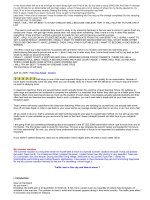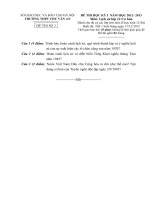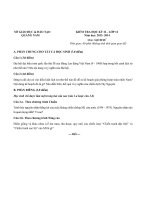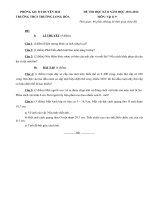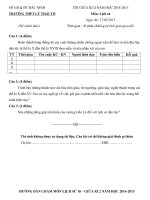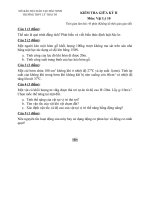Đề cương ôn thi học kì 2 môn Tiếng Anh lớp 9 năm 2019 - 2020 | Tiếng Anh, Lớp 9 - Ôn Luyện
Bạn đang xem bản rút gọn của tài liệu. Xem và tải ngay bản đầy đủ của tài liệu tại đây (162 KB, 2 trang )
<span class='text_page_counter'>(1)</span><div class='page_container' data-page=1>
REVISION GRADE 9 (2
nd<sub> semester) </sub>
<b>GRAMMAR NOTES </b>
<b>1/ Adverb clauses of reason (as, because, since) </b>
<b>S + V + because/ as/ since + S + V </b>
<b> Main clause adv clause of reason </b>
<b>Ex: We watch TV all evening as we had nothing better to do. </b>
<b> Since you won’t help me, I must do the job myself. </b>
<b>2/ Adj. + that clause (is often used after some adjectives: pleased, sad, excited, disappointed, </b>
delighted, glad, afraid, sorry, relieved, worried, surprised, amazed, happy, thankful, certain,
sure… and in the structure: It’s + adj. + that-clause)
<i> Ex: We’re surprised that he failed the exam. </i>
<i> I’m pleased that you are working hard. </i>
<i> It’s important that everybody should feel comfortable. </i>
<b>3/ Conditional sentence : type 1 </b>
<b> If clause Main clause </b>
Verb in present tense will + bare- infinitive
<b> Ex: If it doesn’t rain, we’ll have a picnic. </b>
<b> I’ll phone you if I hear the news. </b>
<b> If you jog regularly, you may lose weight. </b>
<b> You feel cold if the sun doesn’t shine. </b>
<b>Conditional sentence : type 2 </b>
<b> If clause Main clause </b>
Past subjunctive (S + V2/V-ed) S + would/ should/ could + bare- infinitive
<b>Ex: If he were here right now, he would help us. </b>
<b> If I had lots of money, I would travel around the world. </b>
<b> I’d tell you the answer if I knew what it was. </b>
<b> If I were you, I would accept their invitation. </b>
<b>4/ Connectives </b>
<b> *and is used to add a similar or another idea. (Alice is kind and generous.) </b>
<b> *but, however are used to add an opposite idea. </b>
<b> I learnt French easily, but I didn’t like my teacher. </b>
<b> I learnt French easily. However, I didn’t like my teacher. </b>
<b> *because is used to give a cause (reason). </b>
<b> We stopped playing tennis because it started to rain. </b>
<b> *so, therefore are used to give an effect. </b>
<b> It started to rain, so we stopped playing tennis. </b>
<b> It started to rain. Therefore, we stopped playing tennis. </b>
<b> *or is used to introduce another possibility. </b>
</div>
<span class='text_page_counter'>(2)</span><div class='page_container' data-page=2>
<b>5/ Making suggestions: Suggest + V-ing </b>
<b> Suggest (that) + S + should / Suggest + that clause </b>
Ex: I suggest having a party. / going to Dam Sen Park.
I suggest that we should go to Dam Sen Park.
_Another suggestions:
<b> +I think we should + V-bare </b>
<b> +Let’s + V-bare </b>
<b> +Shall we + V-bare …? </b>
<b> +Why don’t you/ we + V-bare …? </b>
<b> +Why not + V-bare …? </b>
<b> +How about / What about + V-ing … </b>
<b> 6/ Adverb clauses of concession: </b>
<b>Though/ although/ even though + S + V, S + V </b>
<b> Ex: Even though I’m tired, I keep on working. </b>
<b> I arrived on time although it rained heavily. </b>
<b> In spite of / Despite + N / Pronoun / -ing, S + V </b>
<b> Ex: In spite of the rain, we enjoyed our holiday. </b>
<b> She wasn’t well, but despite this she went to school. </b>
<b> I didn’t get the job in spite of having the necessary qualifications. </b>
*Compare:
<b> I couldn’t sleep although I was very tired. </b>
<b> I couldn’t sleep despite being very tired. </b>
<b> 7/ Phrasal verbs: </b>
<b> *turn on: switch on / start (Ex: It’s dark here. Can you turn on the light?) </b>
<b> *turn off: switch off / stop (Ex: Please turn off TV when you finish watching.) </b>
<b> *look for: try to find (Ex: It’s important to look for a job after graduation.) </b>
<b> *look after: take care of (Ex: My sister looks after the pet when I am away.) </b>
<b> *go on: continue (Ex: He goes on talking about himself. </b>
<b>8/ Relative clauses: </b>
<b>Defining </b> <b>Non-defining </b>
People who / that who
SUBJECT Things which / that which
People who(m) / that / Ø who(m)
OBJECT Things which / that / Ø which
People whose whose
POSSESSIVE Things whose / of which whose / of which
<i>Ex: The woman is a doctor. She lives next door. = The woman who/ that lives next door is a doctor. </i>
<i>Ex: The man was Mr. Jones. I saw him. =The man who/ whom/ that/ Ø I saw was Mr. Jones. </i>
<i>Ex: She is the woman. I told you about her. = She is the woman about whom I told you. </i>
<i> =She is the woman who/ whom/ that/ Ø I told you about. </i>
<i>Ex: I know the man. His bicycle was stolen. = I know the man whose bicycle was stolen. </i>
</div>
<!--links-->
